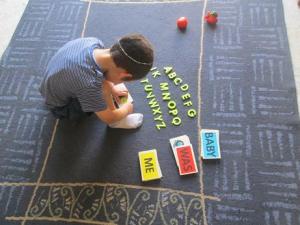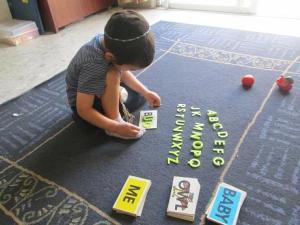Here’s the text of an article from the Haaretz newspaper that I thought was interesting. I’ve touched on a number of the points mentioned below when sharing about the aliyah process and I found the below article worth reading.
**********************************
Life after aliyah: What does it take to make it in Israel? Trials,
tribulations and tips for immigrants to acclimate to a new life in Israel.
First thing to keep in mind: Don’t cry when a bureaucrat is mean to you.
By Judy Maltz
| May.28,
2013 | 5:17 PM | 2
Her father, Jill Ben-Dor recalls, once took note that her refrigerator
was always stocked with Israeli products, while her sister’s was
perpetually filled with American brands. It struck him as unusual since her
sister had been living in Israel longer.
Many years later, Ben-Dor wondered whether her father’s observation might
provide the key to explaining why she stuck it out, while all the other
members of her family, her sister included, eventually packed up and moved
back to the United States.
“My father and sisters had this tendency to think, no matter where they
were, that the grass was always greener somewhere else,” notes Ben-Dor, 53,
who heads the department of donor and associate affairs at Ben-Gurion
University and lives in Be’er Sheva’s affluent southern suburb of Meitar.
“I, on the other hand, made a conscious decision that this is where I am,
and this is home. If I’m going to be here, I’m going to be Israeli all the
way. I’m going to eat Israeli products, read books and newspapers in
Hebrew, watch the news on TV in Hebrew and live like an Israeli.”
Ben-Dor, married to a native-born Israeli and the mother of three grown
sons, will be marking her 30th anniversary in the country this October. Her
conscious effort to go local and resist the temptation among immigrants to
draw comparisons with the places they came from goes a long way, she
believes, toward explaining her successful integration into Israeli society.
Accurate figures on aliyah retention rates from English-speaking countries
are hard to come by since many immigrants who leave Israel do so quietly
without reporting their decision to the authorities.
Chaim Waxman, a retired professor of sociology and Jewish studies at
Rutgers University, has published extensively on aliyah from the United
States and even made the move himself, relocating to Jerusalem full time
seven years ago.
His and other research shows that retention rates were lower before the
1990s, rose dramatically that decade, and dropped off in the early 2000s.
“Until the 1990s, about 38 percent of Americans who came on aliyah went
back within three to five years,” says Waxman. “The main reasons at the
time were being away from family they missed and the Israeli bureaucracy.”
The rate dropped to 10 percent in the 1990s – “before there was even Nefesh
B’Nefesh,” notes Waxman, referring to the organization that handles
immigration from North America and Britain on behalf of the government.
“One of the factors was that by then many people already had family members
here and they were following brothers and sisters who had already come,”
Waxman says. “Also there was more cultural pluralism in Israel by then, and
you didn’t have to learn Hebrew right away or become Israeli right away, as
you did in the past.”
Another factor was a significant reduction in the bureaucracy encountered
by new immigrants, Waxman says. “My estimate is that about 20 percent go
back today,” he says.
The factors behind higher rates of return have also changed. “Based on my
impressions, the main reasons are the higher cost of housing, the
deterioration in the school systems here, religious friction among
different streams of Orthodoxy, and the fact that many of the immigrants
coming today, for example those who come after participating in Birthright,
are less ideologically motivated,” Waxman says. “They come more for
personal reasons.”
*It’s different for men and women*
The ability to maintain a sense of continuity after the move is often what
separates those who make it in Israel from those who don’t, notes Sophie
Walsh, a clinical psychologist and lecturer at Bar-Ilan University who has
studied immigration from English-speaking countries closely.
“When you make a move like this, you lose part of yourself,” she says. “It
often involves giving up careers, salary, status, family and friends. The
better you are able to hold on to a similar career, maintain a comparable
status and rebuild your social networks, the more you feel like you’re
staying yourself and the easier it is.”
According to the research, social and professional factors carry different
weight for women and men. “For women the ability to build close
relationships after the move is often the most critical thing, while for
men it’s generally about maintaining their professional status and
financial success,” Walsh says.
Like others who advise new immigrants, Neil Gillman says the character
trait that often distinguishes those who succeed is flexibility. “We’re
talking about knowing how to move on after that first unpleasant encounter
at the bank, about being able to embrace differences and accepting that it
is what it is,” says Gillman, who oversees immigration from
English-speaking countries at the Jewish Agency.
Resilience is also crucial, maintains Walsh. “The ability to get up after
you’ve fallen down is critical because there are so many blows along the
way,” she says.
Wendy Serlin, who 20 years ago moved to Israel with her family from Silver
Springs, Maryland, was among the first Americans to make Beit Shemesh their
home base. A social worker by training, she has also worked with
organizations over the years that support and counsel English-speaking
immigrants.
Based on her experiences, people who have a tougher time adjusting tend to
thrive on planning and order in their lives, she says.
“A lot of people come from America where they’re used to deciding a year
ahead what they’re going to be doing the following summer and what camps
their kids will be going to,” notes the mother of five. “It just doesn’t
work like that here. If you want to make a go of it in Israel, you have to
know how to flow.”
The other trait critical for success is thick skin, adds Serlin. “You have
to let some of the hardness of native Israelis roll off you and not burst
into tears every time they say something offensive,” she says.
Looking back at her own immigration experience, integrating into Israeli
society would probably have been smoother had she not ended up in an
English-speaking enclave, she says. “I would have liked to have had more
Israelis around, but if the choice is between being in an Anglo community
in Israel or being in New York, I think this is still better.”
*Skype helps, too*
A successful immigration experience, the experts maintain, often depends on
how old new immigrants are when they make the move. “The younger you are,
the easier it is,” says Dorron Kline, the deputy director of Telfed, the
Israeli arm of the South African Zionist Federation. “I always recommend
the sooner the better. Going to university here, the army experience –
those are all formative experiences that help in acclimatization.”
Coming as a single person or as a parent also makes a huge difference,
immigration counselors say. Families have built-in support systems that
single people do not; on the other hand, singles aren’t pressured by the
responsibility of providing for others. Since they have only themselves to
account for, singles also have an easier time leaving if things don’t work
out.
A key factor behind the overall trend of higher aliyah retention rates is
that new immigrants today have much greater access to information, Gillman
adds.
“Being well-prepared and having realistic expectations are the key to a
successful aliyah experience, and the two go hand in hand,” he says.
“There’s a tremendous amount of information out there now on the Internet
and through Facebook groups. We even have people who set their kids up with
Israeli buddies on Skype before they make the move to make the transition
easier.”
Strong religious convictions, notes Kline, can also be an asset during
difficult times. “Because of their strong ideological bent, religious
people often seem to stand up to the challenges of aliyah better,” he says.
Rivkah Lambert, who moved to Ma’aleh Adumim two years ago from Baltimore
with two grown children, finds it particularly challenging making the
adjustment as a middle-aged woman.
“Because my Hebrew skills are still weak, there’s this constant low-level
tension every time I need to communicate with Israelis,” she says. Lambert,
who writes a blog about her immigration experiences, says one of her most
popular entries was about the challenges of finding garbage bags suitable
for the size of Israeli trash bins.
But that, she notes, is the price she pays for the privilege of living in
Israel. “The more I live here, the more I see that the truest Torah life
can only be lived here, and the more I’m convinced that spiritually there’s
no better place for a Jewish person to live,” she says.
In many ways, immigrants from English-speaking countries face a new set of
challenges these days. Decades ago, the move to Israel almost inevitably
entailed a dramatic drop in a person or family’s standard of living. There
were months to wait before receiving a phone line, basic products were
sometimes unavailable at the supermarket, and don’t forget the notorious
Israeli bureaucracy. Much of that has changed as Israel has gained a
foothold in the global economy.
Making a living has also become somewhat easier, with online work and
telecommuting increasingly popular options for new immigrants today. “Gone
are the days when you used to have to resign from your job in order to move
to Israel,” notes Gillman. “People are now bringing their income with them.”
Defining success in aliyah can be tricky, says Josie Arbel, director of
absorption services and programming at the Association of Americans and
Canadians in Israel. For some, it means nothing more than scraping together
a living and putting food on the table, while for others, it means
effecting change in Israeli society. “It’s a lot about the goals you set
for yourself,” she says.
As Gillman notes, the distinction between success and failure isn’t so
clear cut anymore. “These days people have footholds in lots of place,” he
says. “They go to one place, have a great time and move on after two or
three years. Years ago that would have been considered a case of failure.
Today it no longer is.”
Based on his personal experience and extensive research, Waxman says the
following is a tried-and-true formula for successful aliyah:
Spending time in Israel before you decided when you want to come on aliyah.
Loving Jews.
Loving Jewish history.
Having family and friends in Israel.
Having a good sense of humor.
Making a commitment to stay once you’ve come on aliyah.
Having skills that are marketable and a source of income.
Speaking Hebrew helps.
**********************
So what do you think? Do you agree with these points? Do you have any based on your own experience to add?
Avivah

